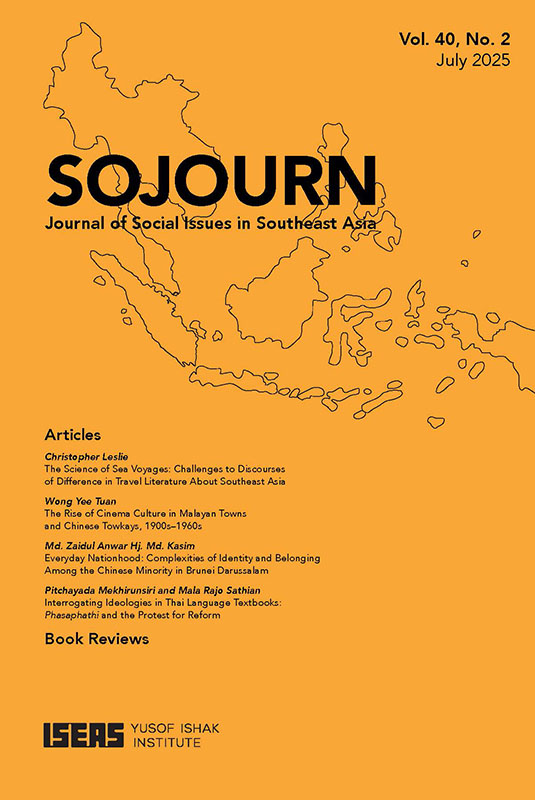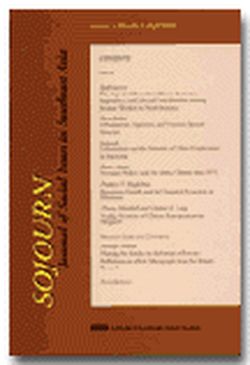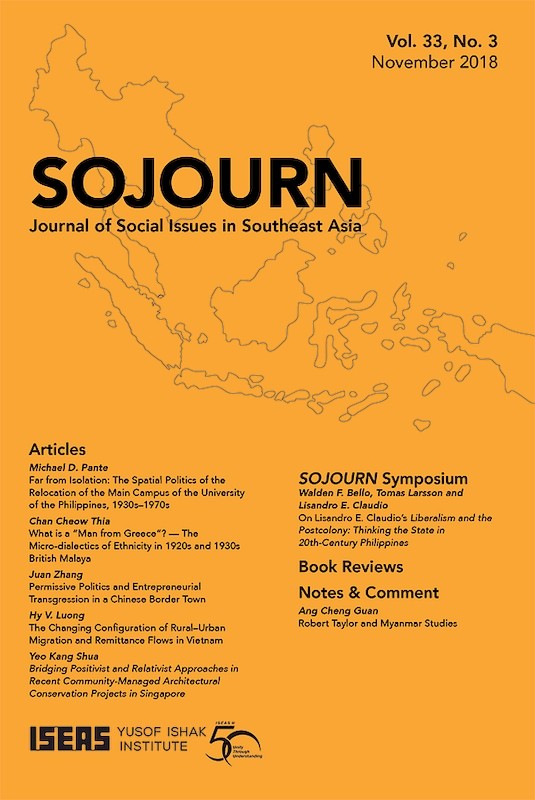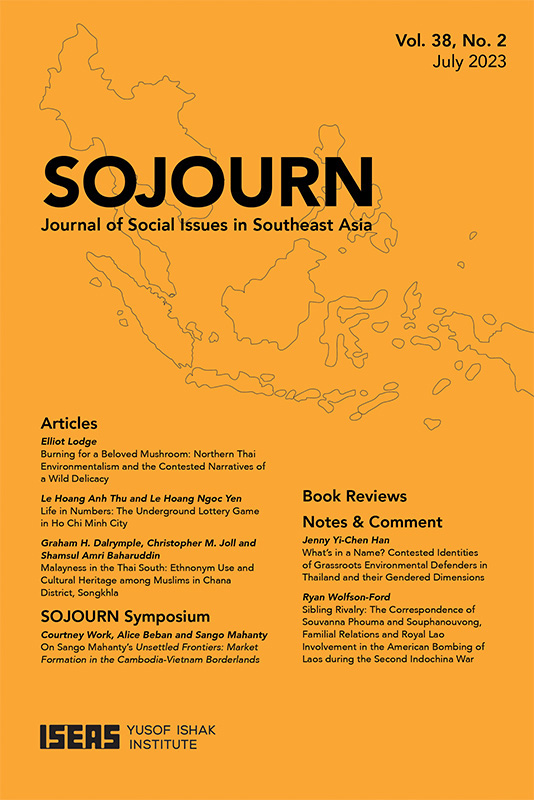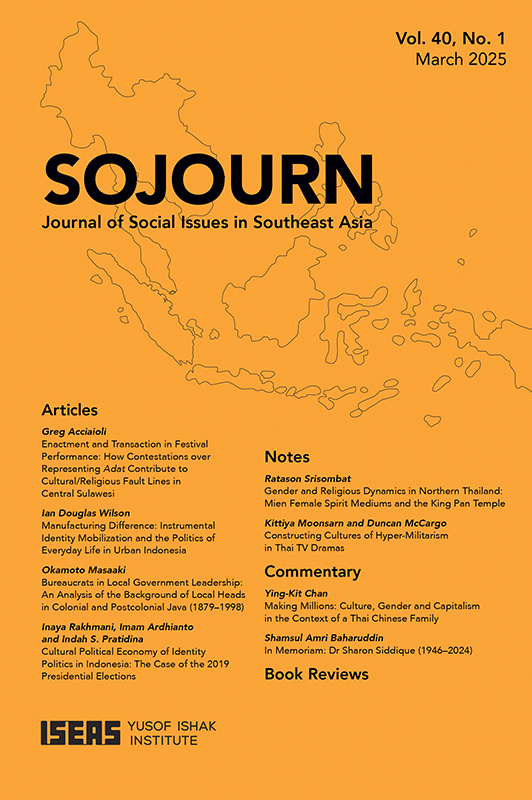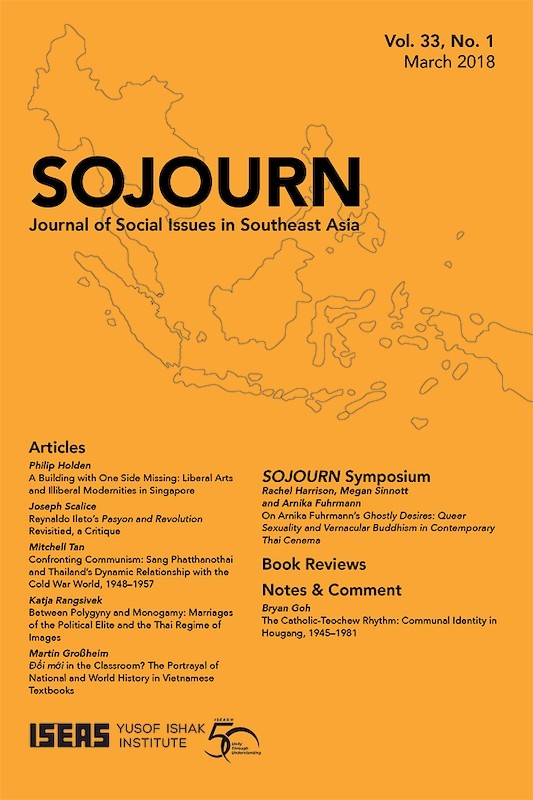SOJOURN: Journal of Social Issues in Southeast Asia Vol. 34/2 (July 2019)
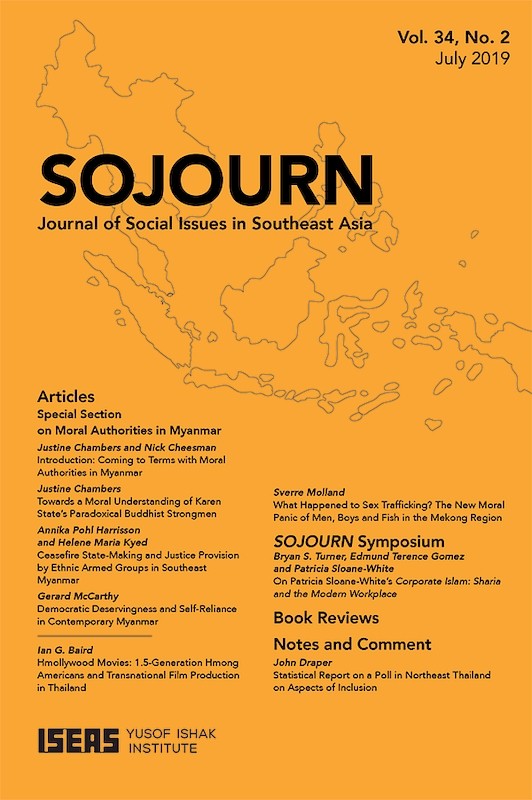
Su-Ann Oh, editor
Date of publication:
July 2019
Publisher:
ISEAS – Yusof Ishak Institute
Number of pages:
260
Code:
SJ34/2
Contents
-
SOJOURN: Journal of Social Issues in Southeast Asia Vol. 34/2 (July 2019)
[Whole Publication, ISSN: 17932858] -
Preliminary pages
- SPECIAL SECTION ON MORAL AUTHORITIES
-
Introduction: Coming to Terms with Moral Authorities in Myanmar, by Justine Chambers, Nick Cheesman, authors see abstractIn post-dictatorship Myanmar, authority rests uncertainly on a host of proliferating appeals to morality. It depends on authorities’ enactment of moral claims. The claims are not uniform. Nor are the authorities that make them self-evident. For both these reasons, this article foregrounds these moral authorities in its discussion of authority. It asks how religious beliefs and cultural norms inform authoritative work in Myanmar today, and what practices people adopt when relating to moral authorities. Pointing to the articles in this special section, it stresses the variability of moral authority, and the diversity of encounters with it in towns, villages and armed groups’ enclaves. The recent ethical turn in anthropology, it suggests, can inform research on moral authorities by drawing out the multiple and seemingly contradictory ways that people come to know and relate to them. In so doing, it invites ethical questions about the study of moral authorities and their relationship to violence in Myanmar, particularly in light of the massive atrocities visited on Muslims in Rakhine State, and widespread anti-Muslim sentiment across the country.
-
Towards a Moral Understanding of Karen State's Paradoxical Buddhist Strongmen, by Justine Chambers, author see abstractThis article considers the role that armed Plong (Pwo) Karen Buddhist strongmen play as moral authorities in their home communities, rather than their coercive and extractive qualities. Based on eighteen months of fieldwork in Hpa-an district, Karen State, it demonstrates that their ability to act as moral authorities in their home communities is embedded in elaborate social notions of interdependency. These are related to the specific formation of Karen personhood and the importance of being ‘faithful’ (in Plong Karen, <i>thout kyar</i>) to each other. In describing how one strongman and his extractive debt relations are configured according to Plong Karen social ethics, the article demonstrates that a core feature of their moral authority is interwoven in a Buddhist cosmological understanding of moral leadership and the public performance of merit-making activities. It argues that the use of public performances of morality through donation ceremonies play a powerful role in mitigating the ways in which illicit economic activities and extractive debt relations are regarded as incommensurate with Plong Karen values.
-
Ceasefire State-Making and Justice Provision by Ethnic Armed Groups in Southeast Myanmar, by Annika Pohl Harrisson, Helene Maria Kyed, authors see abstractThis article explores the state-making efforts of two ethnic armed organizations in Southeast Myanmar through the lens of justice provision. Engaging with current debates about rebel governance and empirical state formation, the article argues that ethnic armed organizations cannot simply be dismissed as rebels focused on extraction and coercion alone, but are also state-makers who nurture legitimate authority. We add to this debate by introducing the new concept of ‘ceasefire state-making’ to capture the particular dynamics of contested state-making and constitution of authority in the liminal phase between armed conflict and a pending peace agreement.
-
Democratic Deservingness and Self-Reliance in Contemporary Myanmar, by Gerard McCarthy, author see abstractHow do communities prove themselves worthy to receive aid from the state in contemporary Myanmar? This article explores how ‘self-reliance’ has become a defining feature of the politics of entitlement since the transition to partial civilian rule. Drawing on sixteen months of ethnographic and survey fieldwork conducted in provincial Myanmar since 2015, it shows how parliamentarians and state officials use ostensibly voluntary contributions of labour and resources by residents to local improvement initiatives as a basis to choose which communities deserve state poverty alleviation assistance. Tracing the moral claims to authorities that village and ward leaders and residents often make before, during and after projects of ‘self-reliant’ public good provision, the article shows how ‘doing it yourself’ infuses the way citizens, politicians, civil servants and even stateless people enact and understand ‘democratic’ duties. It demonstrates that authoritarian-era notions of rights as contingent, competitive and zero-sum are being reinforced rather than undermined via local improvement initiatives despite the civilian-led government’s significant spending on poverty alleviation and development. The article exposes how increased state funding for public goods and poverty alleviation can entrench pernicious distinctions between ‘deserving’ and ‘undeserving’ poor, highlighting how inequality and exclusion endure despite the end of direct military dictatorship.
- ARTICLES
-
Hmollywood Movies: 1.5-Generation Hmong Americans and Transnational Film Production in Thailand, by Ian G Baird, author see abstractHundreds of low-budget Hmong language films—comedies, action films, horror films, historical fiction movies, documentaries and others—have been produced for Hmong American audiences since the 1990s. Most of them have been made by 1.5-generation Hmong American men in Thailand, in collaboration with Hmong Thais who work for Hmong American producers as actors and in various other capacities. Khek Noi sub-district, Phetchabun Province—the most populous Hmong community in Thailand—is the centre of Hmong film-making because of political history, landscape, language, the skills that Hmong at Khek Noi have developed, and because Khek Noi has become a recognizable place for Hmong American film-makers. Indeed, Khek Noi can appropriately be referred to as ‘Hmollywood’, even though there have been tensions between Hmong American film-makers and Hmong Thai who have worked for them. The American market for Hmong films is, however, facing serious challenges, leading Hmong American film-makers to look for new directions in producing and marketing films. This article engages with the literature on transnational cinema, arguing not only that there are transnational and globalized influences on the Hmong film-making industry, but also crucial place-based ones.
-
What Happened to Sex Trafficking? The New Moral Panic of Men, Boys and Fish in the Mekong Region, by Sverre Molland, author see abstractActivists, non-governmental organizations (NGOs) and the international media have repeatedly singled out the Mekong region as a hotspot for ‘sex trafficking’. Yet, in recent years anti-trafficking campaigns that focus on prostitution have lost momentum, witnessed by a decline in project activity and media attention. This article suggests that a moral panic relating to prostitution has partly been overshadowed by a broader focus on the Thai labour sector, particularly the fishing industry. At the same time, this shift coincides with a discursive reorientation away from ‘trafficking’ towards ‘modern slavery’. This article explores the gendered dimensions of this shifting regime of migration governance which in effect replaces women and girls with men and boys as the central locus for action. Although this change must be understood in light of structural changes within the Thai economy and a broader compassion and programme fatigue, this article points to the similar moral registers that both ‘sex trafficking’ and ‘slavery at sea’ invoke. Neoliberal modes of activism coupled with emergent social media help explain why anti-trafficking and modern slavery discourses have gradually redirected attention away from sex to fish.
- SOJOURN SYMPOSIUM
-
On Patricia Sloane-White's Corporate Islam: Sharia and the Modern Workplace, by Bryan S Turner, Edmund Terence Gomez, Patricia Sloane-White, authors see abstractReview essays by Bryan S. Turner and Edmund Terence Gomez, with a response from Patricia Sloane-White.
- BOOK REVIEWS
-
BOOK REVIEW: Becoming Arab: Creole Histories and Modern Identity in the Malay World, by Sumit K. Mandal, by Peter G Riddell, author
-
BOOK REVIEW: Soul Catcher: Java's Fiery Prince Mangkunagara I, 1726–95, by M.C. Ricklefs, by Edwin P Wieringa, author
-
BOOK REVIEW: Siam and World War I: An International History, by Stefan Hell, by Chris Baker, author
-
BOOK REVIEW: White Métisse, by Jack Yeager, by Leslie Barnes, author
-
BOOK REVIEW: Mahathir's Islam: Mahathir Mohamad on Religion and Modernity in Malaysia, by Sven Schottmann, by Norshahril Saat, author
-
BOOK REVIEW: Through Turbulent Terrain: Trade of the Straits Port of Penang, by Loh Wei Leng with Jeffery Seow, by Michael J Montesano, author
-
BOOK REVIEW: Bangladeshi Migration to Singapore: A Process-Oriented Approach, by Md Mizanur Rahman, by Diotima Chattoraj, author
-
BOOK REVIEW: Sovereign Women in a Muslim Kingdom: The Sultanahs of Aceh, 1641–1699, by Sher Banu A.L. Khan, by Rosnida Sari , author
- NOTES & COMMENT
-
Statistical Report on a Poll in Northeast Thailand on Aspects of Inclusion, by John Draper, author

